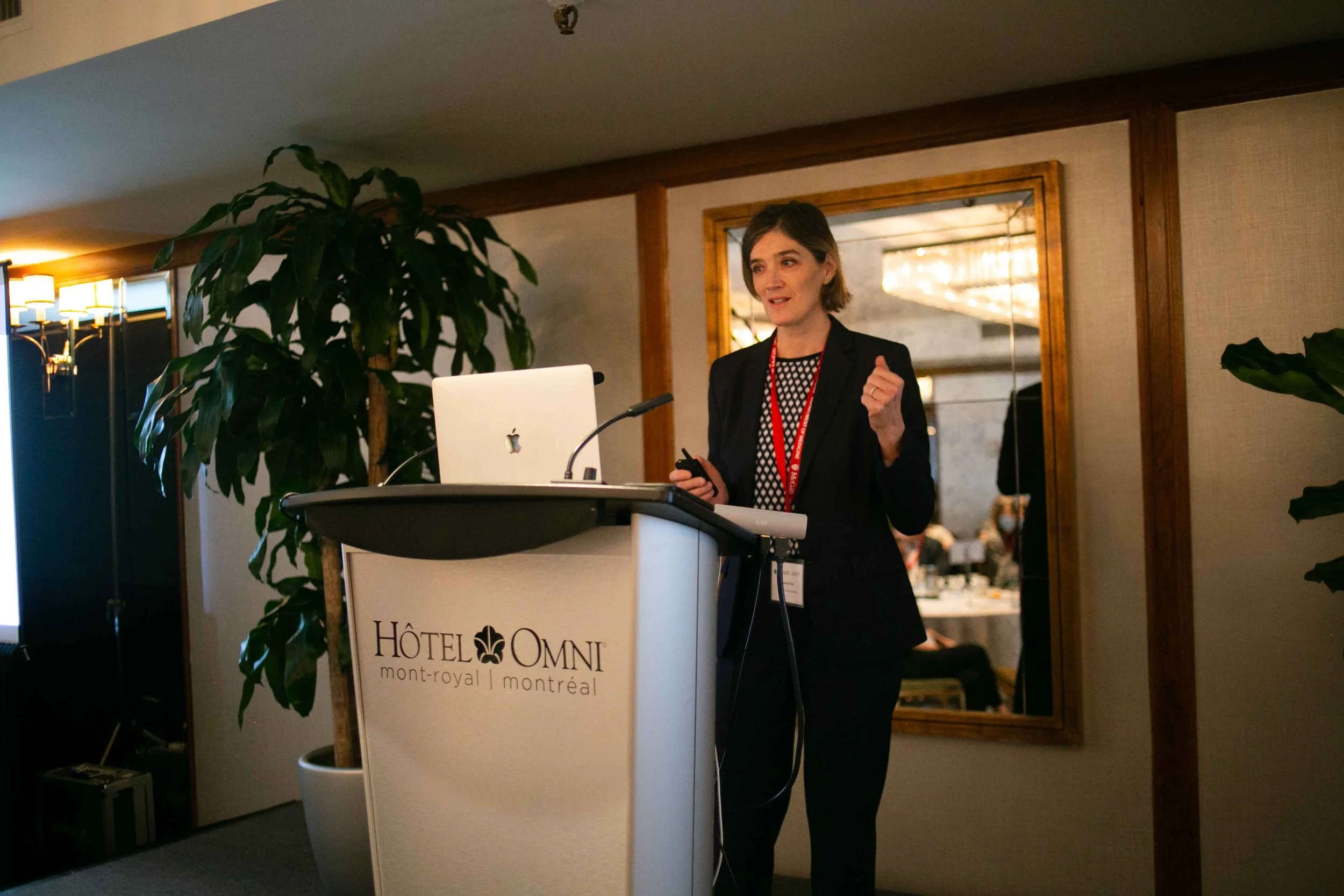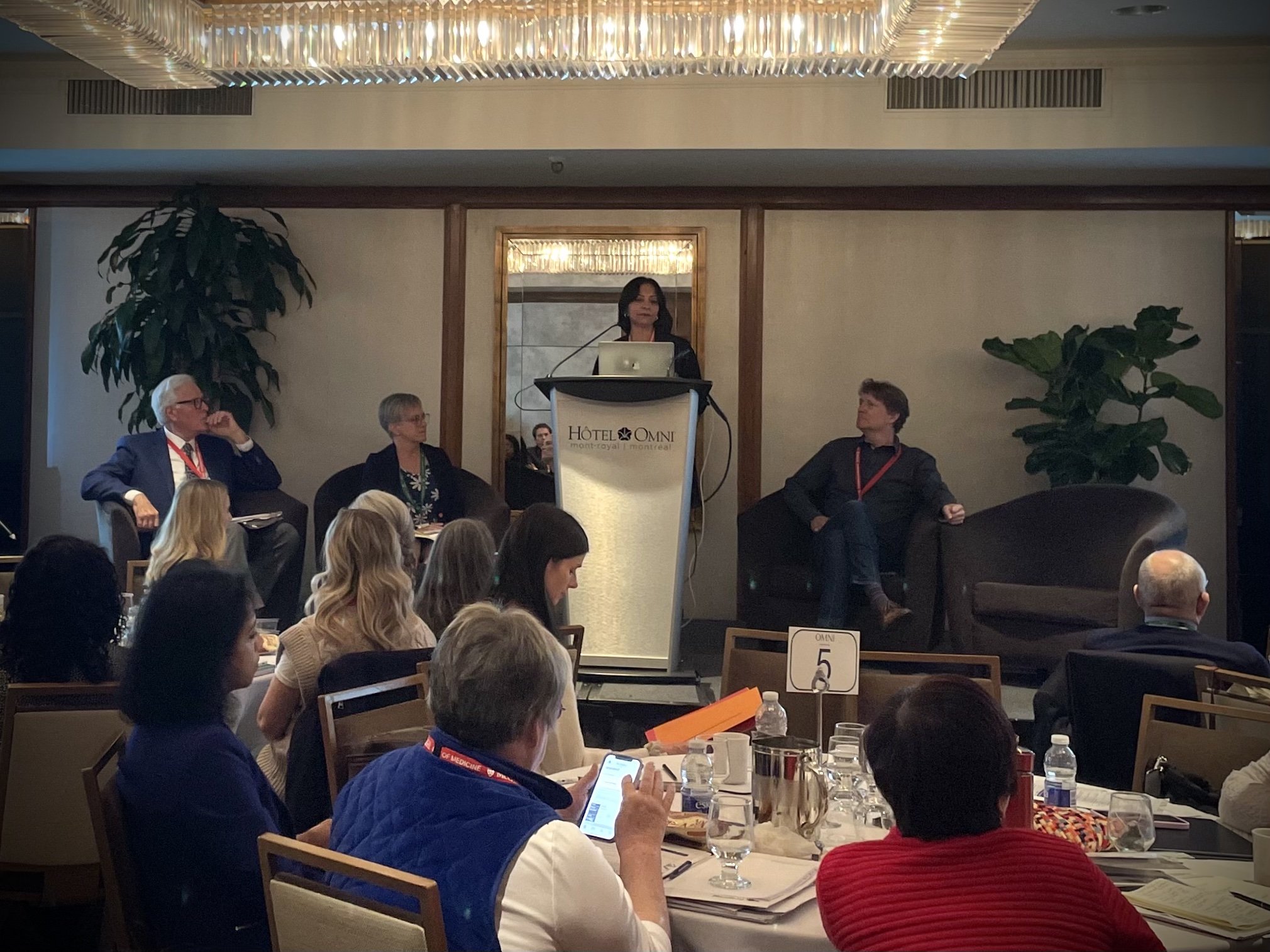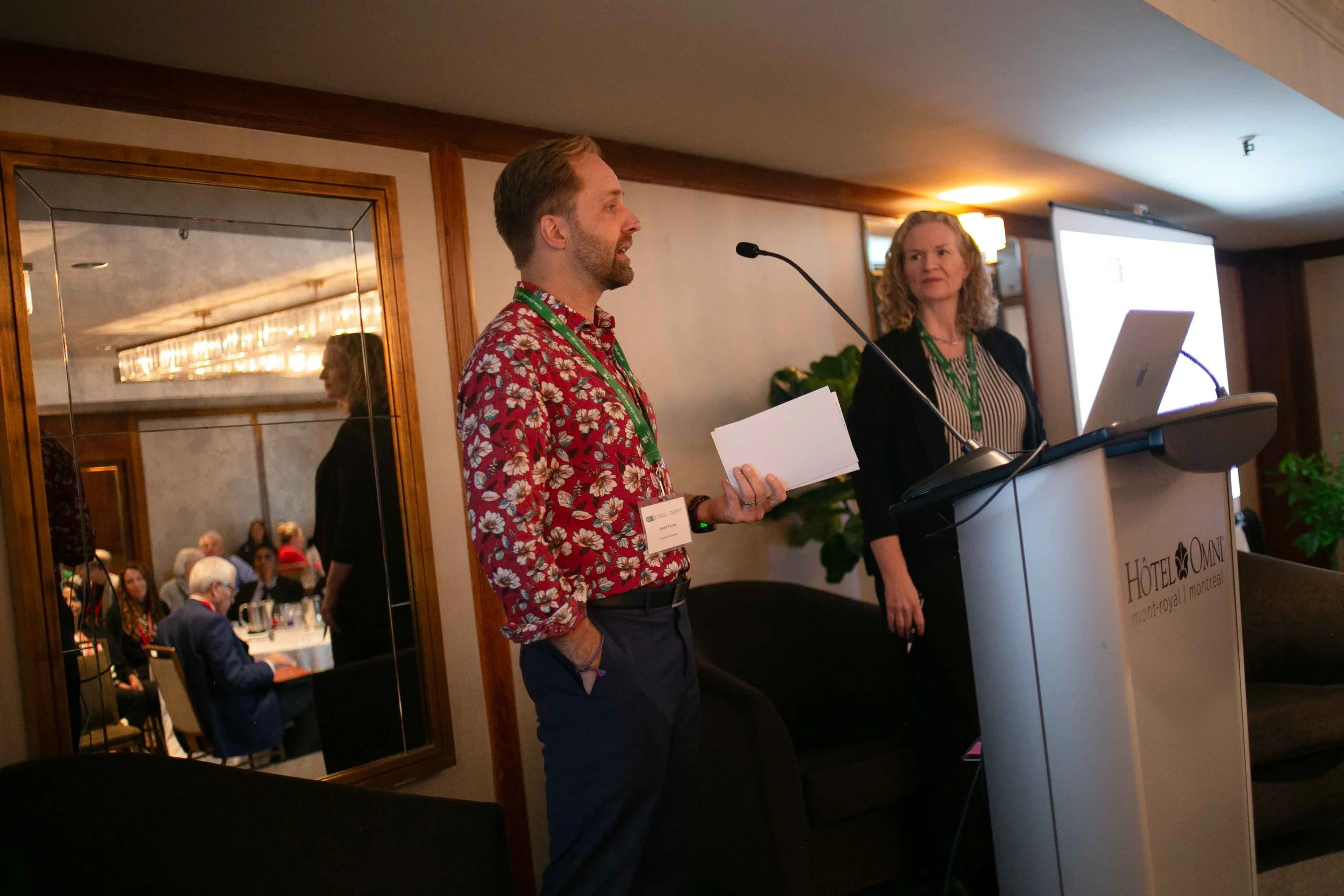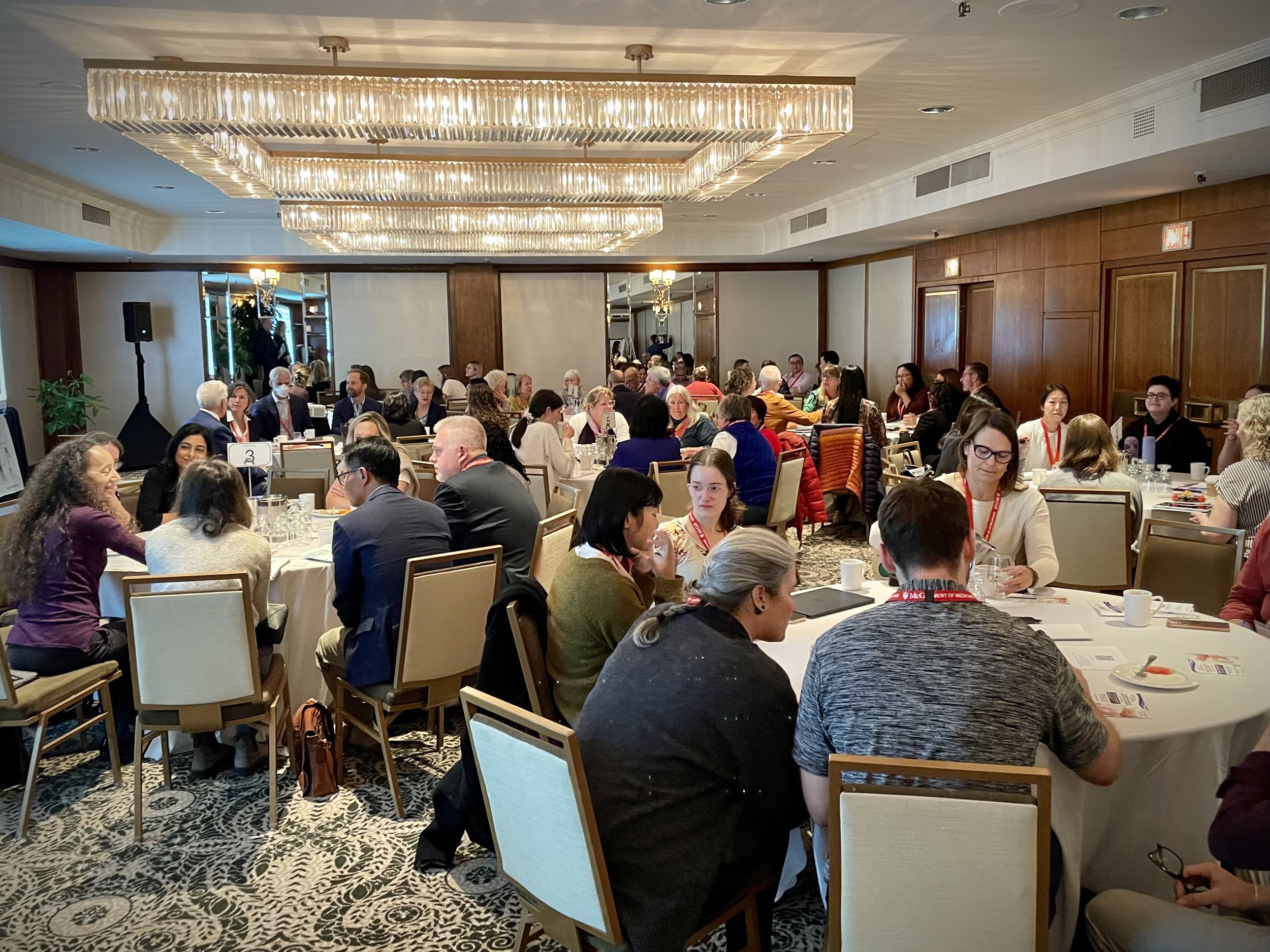2023
National Meeting Summary Report
A look back on each session, takeaways and much more!
The Canadian Medication Appropriateness and Deprescribing Network (CADeN) would like to thank everyone who participated in the 2023 National Meeting, held in Montreal on November 8th and 9th, 2023! View photos of the Summit here.
Discover the goals, key themes and outcomes from the National Meeting in the published proceedings here
Why bring us together?
In order to reduce the inappropriate use of medications and promote access to safer alternatives, it is essential to share experiences & knowledge, as well as strengthen ties between individuals who share these goals. To this end, the CADeN 2023 National Meeting brought together key players from across the country, including patient partners, community leaders, healthcare professionals, researchers, representatives of healthcare organizations, students, and decision-makers. As for the theme of the event, we encouraged participants to consider how, upon return to their respective spheres, they could “plant the seeds for deprescribing”!
The objectives of the 2023 National Meeting were the following:
Provide an opportunity to network and a forum for open dialogue between different partners, including community members, clinicians, policymakers, and researchers.
Present research, tools and activities supporting regional initiatives which promote the appropriate use of medications.
Contribute to national efforts in the development of a pan-Canadian strategy for the safe and appropriate use of medications by Canadian Drug Agency Transition Office.
Share different national and regional approaches to promote the appropriate use of medications.
Funding organization
The Canadian Medication Appropriateness and Deprescribing Network thanks Health Canada for its financial support, without which this event would not have been possible.
Who attended the National Meeting?
To include a diverse set of perspectives, it was important to welcome representatives from different spheres. Below is the distribution of participants according to their sphere of influence:
Where were National Meeting participants from?
Not only was it important for us to invite participants with diverse professional, personal, and lived experiences, we also endeavored to ensure representation from many different communities from across the country. The following chart shows the geographic regions represented by meeting participants.
Morning of November 8th: CADeN Committee Meetings
The Summit kicked off with CADeN’s Public Awareness Committee, Research Committee, and Healthcare Professional Committee each convening. Hard to believe, but these committees had not met face-to-face in over five years!
After introductory remarks and a brief update from Executive Director Jim Silvius and Scientific Director Emily McDonald, the committees got down to business. In their initial meeting, each of the committees aimed to:
Identify successful initiatives from the last few years,
Conduct a SOAR analysis of strengths/achievements, opportunities, aspirations, and desired outcomes for their committee, and
Determine the committee's priorities and draw up an achievable action plan and timeline.
CADeN’s Public Awareness Committee (photo on the left) and Research Committee (photo on the right) meeting tables.
The outcomes of each discussion were then presented to members of the other committees with one goal top of mind: to identify opportunities for collaboration to achieve each of the defined objectives. For instance, the Research and the Patient Awareness Committees agreed that a stronger partnership was needed to co-develop research initiatives that respond to real needs in appropriate medication use, expressed by patients and their loved ones. As for the Healthcare Professionals Committee, they presented their plan to integrate deprescribing competencies into university-level healthcare curricula, with the additional aim of measuring the impact of these efforts. Once more, a partnership with the Research Committee was welcomed to ensure this process would be thoroughly documented and evaluated.
Brenda Schuster (photo on the left) of the Healthcare Professional Committee and Johanna Trimble (photo on the right) of the Public Awareness Committee.
November 8th Afternoon: Canadian Drug Agency Transition Office (CDATO) Consultations
Many new participants joined CADeN committee members in the early afternoon of November 8th to take part in the CDATO’s consultation sessions.
During the first keynote address of the National Meeting, Susan Fitzpatrick, head of the CDATO, provided an update on efforts to create a Canadian Drug Agency (CDA). She also shared their next steps towards the implementation of a national strategy for the appropriate use of medications in Canada.
Participants were then given the opportunity to contribute to the development of the strategy presented by Susan Fitzpatrick. In small groups, they shared their perspectives on priority activities for the CDA’s appropriate use program, and discussed ways not only to evaluate these activities but to communicate evaluation results to the public. The conversations held during these consultations were rich and varied, as expected with the broad range of partners in attendance. These consultations have been documented and will guide the CDATO in its next steps.
Susan Fitzpatrick, head of the Canadian Drug Agency Transition Office, presenting the first keynote of the National Meeting.
Scientific Poster Competition on Medication Appropriateness and Deprescribing Research
Scientific poster presentations from students and trainees.
Following an afternoon of discussions, a dozen students from different universities presented their research on appropriate use of medications and deprescribing as part of a scientific poster competition. It was an excellent opportunity to showcase the next generation of researchers in this field!
The overall quality of the posters impressed competition judges and attendees. The judges had a difficult decision to make, but finally came to an agreement and awarded the following prizes:
Winners of the scientific poster competition. From left to right: Henry Michael, student in the Department of Experimental Medicine at McGill University; Dr. Emily McDonald, Scientific Director of CADeN and Associate Professor of Medicine at McGill University; Jimmy Lee, student in the Digital Health Innovation Program at McGill University; Émilie Bortolussi-Courval, clinical nurse and student in the Department of Experimental Medicine at McGill University.
First place: Jimmy Lee, Digital Health Innovation program, McGill University ; Poster Title: Mechanisms on Reporting Adverse Drug Events.
Second place: Henry Michael, Department of Experimental Medicine, McGill University ; Poster Title: The Clinical Utility of Anticholinergic Burden Scales in Medication Risk Assessment and Deprescribing: A Systematic Review and Gap Analysis.
Third place: Émilie Bortolussi-Courval, Department of Experimental Medicine, McGill University ; Poster Title: Deprescribing in Patients on Hemodialysis: A Prospective, Controlled, Quality Improvement Study using MedSafer.
Morning of November 9th:
Full of excitement and energy, participants regrouped once again to kick off the second day of the National Meeting. The day started with a bang, with presentations from several successful Canadian initiatives to improve the way we use medications:
Georges Marcoux, Sleepwell patient partner.
Get better sleep with Sleepwell: Alongside Dalhousie University researcher Dr. David Gardner, patient partner Georges Marcoux presented his journey deprescribing medications for insomnia. Sleepwell helps patients get better sleep through Cognitive Behavioural Therapy for Insomnia (CBTi).
From left to right : Émilie Bortolussi-Courval and Dr. Emily McDonald present MedSafer’s achievements.
MedSafer: an IT tool to support deprescribing: Dr. Emily McDonald and Émilie Bortolussi-Courval explained how MedSafer, an IT tool, helps prescribers initiate and complete the deprescribing process for different patient populations.
From left to right: Dr. Justin Turner and Linda Oldford presenting the SaferMedsNL initiative.
A Provincial Deprescribing Program: SaferMedsNL: In collaboration with patient partner Linda Oldford, Dr. Justin Turner from Monash University presented the impact of the SaferMedsNL program, which put in place a reimbursement program for community pharmacists' deprescribing activities, raised public awareness, and educated healthcare professionals to promote the deprescribing of sleeping pills and proton pump inhibitors. This type of multi-stakeholder approach is called collective impact.
Dr. Corinne Hohl presenting the ActionADE initiative.
Preventing re-exposures to previously harmful medications with ActionADE: Dr. Corinne Hohl from the University of British Columbia, and Johanna Trimble, patient partner, presented how ActionADE enables healthcare professionals to document patient-reported adverse events and share this information across care settings to reduce the risk of re-exposure to the drugs involved, an all-too-common phenomenon due to gaps in information sharing.
Each of the presentations in this first session demonstrated the importance of inter-professional collaboration and partnership with the public in ensuring the success of the various programs.
First group activity: Spark! Big Ideas for Reducing Medication Overload!
Dr. Andrea Murphy leading the group activity.
CADeN executive members Drs. Andrea Murphy and Wade Thompson led a group activity with the objective of generating creative ideas to promote the appropriate use of medications and deprescribing, thus sowing the seeds of deprescribing! Participants were asked: what's your big idea for reducing the harmful effects of medication overload?
After a moment of individual reflection, participants presented each of their ideas with other participants at their table. Each table then had the opportunity to build on top of these ideas, even combining several of them together! This led to the production of one big idea per table. These ideas were presented to the whole group of participants, were noted on large posters, and submitted for a vote! Indeed, participants were invited to vote for the best ideas over the course of the next few hours, using coloured stickers to select what they considered to be the posters presenting the best ideas. Click here to discover the winning ideas!
National Meeting participants sharing and considering their big ideas, with the aim of voting for the best contribution.
Exhibition Booths: an assembly of health organisations promoting the appropriate use of medications!
One of the objectives of the National Meeting was to equip participants to promote the appropriate use of medications and deprescribing in their own communities and networks. A dozen partners were present alongside CADeN. Below is a list in alphabetical order:
From left to right: Bill Berryman, member of CADeN’s public awareness committee, and Dr. David Gardner connecting by the exhibition booths.
Terence Young for his recent book Forbidden Knowledge: A Self-Advocate's Guide to Managing Your Prescription Drugs
Each group used this occasion to present their resources and to meet participants: brochures, online tools, books – a range of tools were available, all with the goal of supporting participants in their efforts to plant the seeds for deprescribing!
On the left: exhibition booth for Deprescribing.org, a healthcare organisation, represented by Drs. Wade Thompson and Lisa McCarthy.
On the right: exhibition booth for MedSafer, an IT software promoting medication safety, represented by Dr. Emily McDonald and Émilie Bortolussi-Courval.
Concurrent Session 1: Towards Reconciliation: Partnering in Indigenous-led Research
From left to right: Dr. Larry Leung, Rhonda Schooner, Verna Arcand and Dr. Cheryl Sadowski, speakers of the “Towards Reconciliation: Partnering in Indigenous-led Research” session.
Indigenous community members continue to face oppression and racism when it comes to receiving care, including pharmaceutical care. Verna Arcand, Assistant Director of Education and Member of Alexander First Nation, and Rhonda Schooner, Land-Based Healing Cultural Support Worker and member of Nuxalk First Nation, courageously shared their experiences with the healthcare system in this session, illustrating the prevalence and terrible impacts of racism in health care, as well as the pressing need to work together to ensure culturally safe care for Indigenous peoples. Among other things, they discussed their personal experiences with pharmacists and medications, as well as the importance of traditional medicines in their respective
cultures.
Their testimonials emphasized the urgency and importance of work to decolonize and Indigenize health care in Canada. Researchers and pharmacists, Dr. Cheryl Sadowski from the University of Alberta, and Dr. Larry Leung from the University of British Columbia, stressed the importance of increasing the decision making and involvement of Indigenous community members in health education and research by describing their efforts in this direction, including the co-development of a model for culturally safe pharmacy services.
Concurrent Session 2: Oral Research Presentations (Short Snappers)
The National Meeting provided an opportunity for several researchers to present their findings, as well as the measured impact of their research focused on understanding and improving the way we use medications.
Dr. Lise Bjerre (photo on the left) and Katherine Desforges (photo on the right) sharing their research findings.
Dr. Wade Thompson from the University of British Columbia and Dr. Lisa McCarthy from the University of Toronto presented the achievements and future directions of Deprescribing.org. This organization has grown significantly in Canada and around the world over the past ten years, having published, to mention but a few of their major outputs, five evidence-based deprescribing guidelines and algorithms. To date, there are over 30 adaptations or translations of these documents around the world.
Katherine Desforges from the University of Montreal presented her qualitative research project carried out at Monash University, Australia, examining pharmacists' communication about deprescribing at the transition of care from hospital to community.
Dr. Lise Bjerre from the University of Ottawa presented the impact of patient-facility language discordance on inappropriate prescribing of antipsychotics in Ontario long-term care facilities.
Dr. Wade Thompson, who stepped in for Dr. Colin Dormuth from the University of British Columbia, presented un overview of the Portraits program led by the Therapeutics Initiative, a healthcare organization in British Columbia. This audit and feedback program enables family physicians and nurse practitioners to analyze their own prescribing practices, compare them with those of their peers, and provides them with evidence-based information and tools.
Pilot Projects and Beyond—the US Deprescribing Research Network Experience
Dr. Mike Steinman presenting on his experience in deprescribing research in the United States.
Following these concurrent sessions, all participants gathered to listen to a keynote session presented by Dr. Mike Steinman, geriatrician and director of the U.S. Deprescribing Research Network. He presented his journey in securing funding for deprescribing research in the United States. In the US, as elsewhere in the world, there are few funding sources dedicated to this field. He shared strategies for leveraging existing funding opportunities and proposed areas to prioritise in research on deprescribing, including the direct economic effects of deprescribing, and greater inclusion of patients from diverse populations in these clinical activities.
Discussion Panel: Saving the Future from Too Many Pills?
Dr. Barb Farrell, CADeN executive member, welcomed three panelists to answer one big question: how can we save the planet from medication overload?
Discussion panel, moderated by Dr. Barb Farrell. From left to right: Terence Young, Dr. Barb Farrell, Dr. Lalitha Raman-Wilms and Dr. Myles Sergeant
Each speaker had their own unique viewpoint: Dr. Myles Sergeant, executive director of the Canadian Coalition for Green Healthcare, demonstrated the ways in which deprescribing could play a key role to reduce the environmental impacts of healthcare systems, including their carbon footprint.
Dr. Lalitha Raman-Wilms, dean of the Faculty of Pharmacy at the University of Manitoba and chair of CADeN’s Health Care Provider Committee, described how strengthening providers’ deprescribing competencies is essential for increasing patient access to the safe use of medication.
Terence Young, former Member of Parliament and founder of the Protecting Canadians from Unsafe Drugs Act (Vanessa's Law) which requires healthcare institutions to report serious adverse drug reactions, described the ways in which strengthening policies around this reporting would help reduce harm.
Inequitable and Inappropriate: Solving Two Problems with One Short List
Dr. Nav Persaud presenting his research findings.
Dr. Nav Persaud, Canada Research Chair in Health Justice, provided the second keynote of the day. In his presentation, he explained the link between inappropriate prescribing and inequitable access to medications in Canada, and described the results of the CLEAN Meds clinical trial. This study measured the impact of equitable access to medication on people's health, as well as the cost reductions this would represent for the healthcare system. He also explained the need for a shortlist of essential medicines in the fight against inappropriate drug use.
Second group activity: Pulling It All Together: Moving from Ideas to Action
Dr. Justin Turner (on the left) and Dr. Lisa McCarthy (on the right) leading the second group activity.
Dr. Lisa McCarthy and Dr. Justin Turner, CADeN executive members, led the final group activity of the National Meeting. After planting the seeds for ideas and allowing them to grow, it was time to harvest the fruits of participants’ work! The activity also aimed to help participants identify tangible actions they could put in place to promote the appropriate use of medications in their community or network.
What were the results?
After tallying all the votes votes, here were participants’ top three ideas for reducing the harmful effects of medication overload!
First place (tied): Produce a "Canadian Heritage Commercial"-style educational video on medication appropriateness and deprescribing. Blending humor and emotion, this short video would encourage patient empowerment and be broadcast across the country.
First place (tied): Encourage each province and territory to adopt a collective impact approach, a “SaferMedsNL 2.0”. This would include support to implement evidence-based initiatives, improved collaboration between healthcare professionals and patients, the integration of deprescribing curriculum in healthcare professional education, and public awareness campaigns.
Second place: Create a "National Spring Cleaning Your Medications Day", to encourage patients to re-evaluate their medications with a healthcare professional in an effort to avoid medication overload.
In summary, all agreed that prioritising public awareness and education on the matter, as well as greater government involvement, are necessary to create change on a systemic level.
Impact of the National Meeting
It was important for our team to measure the impact of the event on participants through a short survey. It was immensely gratifying to see that, among participants who completed the survey, the vast majority left with a better understanding of the needs, gaps and trends in medication appropriateness and deprescribing in Canada. Similarly, most respondents reported feeling more motivated and equipped to play an active role in improving medication appropriateness and deprescribing (see Figure 1).
Figure 1: Results from the participant survey to measure the impact of the CADeN 2023 National Meeting.
Responses from our survey are very encouraging! We'll be sharing more results from this survey in future communications - stay tuned!
Thank you to all our participants!
Participants of the CADeN 2023 National Meeting.
The 2023 National Meeting was full of flourishing ideas to help us plant the seeds for deprescribing in Canada, and beyond. Importantly, the National Meeting provided an opportunity to hear patient voices, who are the ones we all work for. The meeting also underscored the urgency to acknowledge shortcomings and further prioritize efforts to engage with and learn from Indigenous peoples, as well as other equity-deserving groups, in order to ensure our efforts improve appropriate medication use in these populations. Based on the sharing of knowledge and tools, and the initiation of new collaborations between various partners, we’re optimistic for the future of medication appropriateness and deprescribing in Canada. Our participant survey results also give us hope as to the positive impact of the event!
Once again, we would like to thank Health Canada for their financial support in making this event possible, and of course all the participants for being so involved and committed over the two days.

























